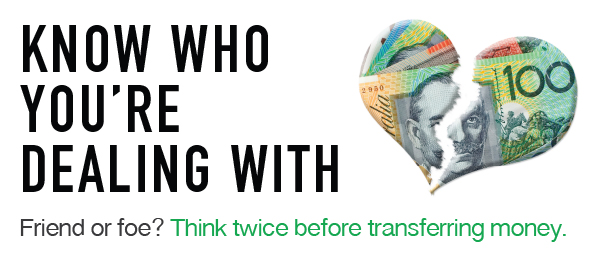National Consumer Fraud Week 16 – 22 June 2014
An Australian Consumer Taskforce Initiative
Have you ever wondered if someone is the real deal? These days, scammers are highly skilled at building deceptive relationships, using all sorts of tricks to convince you to trust them and part with your personal details and money.
Australians are increasingly going online to connect. Unfortunately scammers like connecting online too – with victims. National Consumer Fraud Week 2014 is all about learning how to identify, avoid and disengage from scammers.
Scammers know how to play you online.
- You’ll never meet them in person.
- They’ll hide behind a façade based on real people.
- They’ll isolate you by moving the interaction to a private platform.
- They will take the time to find out all about you, but you will never really know them.
- They will do all of this, and more, just to get you to part with your personal details or money.
If you meet someone online and they ask for any money, big or small, you are dealing with a scammer.
Know who you’re dealing with – follow the Top 5 Scam Identifier list:
- You’ve never met or seen them: scammers will say anything to avoid a ‘face-to-face’ meeting, whether it be in person or over the internet via a video chat – don’t excuse it away.
- They’re not who they appear to be: scammers steal photos and profiles from real people to create an appealing facade. Run a Google Image search on photos and search words in their description to check if they’re the real deal.
- They ask to chat with you privately: scammers will try and move the conversation away from the scrutiny of community platforms to a one-on-one interaction such as email or phone – ‘walk’ away if this happens to you.
- You don’t know a lot about them: scammers are keen to get to know you as much as possible, but are less forthcoming about themselves. Ask yourself, ‘how well do I really know this person?’
- They ask you for money: once the connection’s been made – be it as a friend, admirer, or business partner – scammers will ask you to transfer money. Don’t fall for a tall tale, not matter how plausible it sounds.
- Think twice before transferring money
Visit SCAMwatch to find out how scams work, how to protect yourself and what to do if you’ve been scammed: www.scamwatch.gov.au Check out Know who you’re dealing with for more information on Fraud Week 2014, an initiative of the
Australasian Consumer Fraud Taskforce. The Indigenous Consumer Assistance Network Ltd is a Member/Partner of the Taskforce and urges you to protect yourself against scams.
